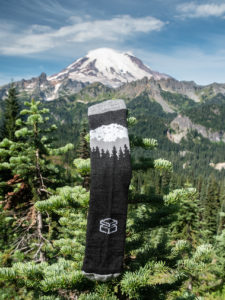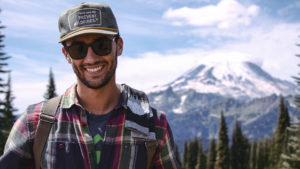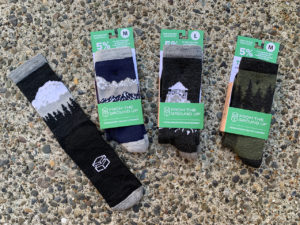Alumni Startup Spotlight: From the Ground Up Socks
 There’s an old saying that “people don’t buy what you do, they buy why you do it.” University of Washington alum Rami Nasr (Communication ’16) hopes both will ring true for his apparel startup From the Ground Up. The Seattle-based sock brand uses Merino wool to create a more comfortable experience for hikers and outdoor enthusiasts while also promoting the preservation of local trails.
There’s an old saying that “people don’t buy what you do, they buy why you do it.” University of Washington alum Rami Nasr (Communication ’16) hopes both will ring true for his apparel startup From the Ground Up. The Seattle-based sock brand uses Merino wool to create a more comfortable experience for hikers and outdoor enthusiasts while also promoting the preservation of local trails.
A few months after launching in August of 2018, From the Ground Up Socks created a partnership with the Washington Trails Association. Nasr says 5% of every sock purchase goes to the non-profit’s work to safeguard over 3,500 hiking trails in Washington state. In the meantime, the startup started getting more and more media traction. Early exposure included everything from clothing to outdoor bloggers to the November 2019 podcast Side Hustlers with Carla Marie from Seattle-area radio station 106.1 KISS FM.
Nasr spoke with the Buerk Center about that experience and how his determination to take entrepreneurship classes at UW shaped his journey.
Q: Your UW experience included the communications program, the Entrepreneurship Minor, and the Professional Sales Certificate. How did those influence where you are now?
Nasr: In my junior year I was at a total loss for what I wanted to do. I didn’t get accepted into the Business School and considered taking a leave from school for a quarter to re-evaluate my direction. On the first day of winter quarter, I had this ridiculous schedule with one psych class and nothing else. So, I built this fantasy schedule with courses in business communication, intro to sales, and intro to entrepreneurship and I ended up getting into all of those classes. I knew this was a turning point.
 In the Intro to Entrepreneurship class, I remember how much I fell in love with the whole process. Fast-forward another quarter and I took Creating a Company and we started an aromatherapy business with these little necklaces that helped students with memory recall. That 2-quarter class itself was what set me up for success in running my actual business. It taught me the fundamentals of how to have an idea, form a team, write a business plan, and pitch it to a board of investors. And the following quarter, I learned how to take that capital, budget it wisely, and start selling the product. That was my biggest takeaway from school. The entrepreneurship program was my bread and butter. Communications taught me to do public speaking and navigate the corporate world, and the sales program helped elevate what I was naturally good at–which is sales.
In the Intro to Entrepreneurship class, I remember how much I fell in love with the whole process. Fast-forward another quarter and I took Creating a Company and we started an aromatherapy business with these little necklaces that helped students with memory recall. That 2-quarter class itself was what set me up for success in running my actual business. It taught me the fundamentals of how to have an idea, form a team, write a business plan, and pitch it to a board of investors. And the following quarter, I learned how to take that capital, budget it wisely, and start selling the product. That was my biggest takeaway from school. The entrepreneurship program was my bread and butter. Communications taught me to do public speaking and navigate the corporate world, and the sales program helped elevate what I was naturally good at–which is sales.
Q: How did the experience of working on two business ideas while at UW set you up for success?
Nasr: Both ideas I took very seriously. The first was a networking app like Tinder, but for friends. Basically, you would get connected to people in the city who had similar interests to you. But being so new to this world, I didn’t know anything. I formed a team and we were meeting once a week and getting some work done, but over time it fizzled out. Moving into the Creating a Company class, another buddy of mine came up with the aromatherapy necklace which closed the book on the app. With the necklace, we ran the business for the full two-quarters and generated a profit. However, our team wasn’t ready to take that idea forward, so we tabled it. I learned a lot from those two experiences—like how to identify a current problem and create a business that solves it, and more importantly, how to execute on that idea. It was great that we had that experience in college because it’s pretty low risk and it’s not like we were investing tons of our own personal capital in there.
Q: So that’s the same time period as another sock company, Strideline, came out of UW. Did their work inspire you in any way?
Nasr: The Strideline story is awesome and I learned a lot from it. My buddy’s an account executive there and we talked about it over drinks one day. The thing that Jake (Director) and Riley (Goodman) did at Strideline is very similar to what I’m doing, but we’re doing it in completely different markets. They are focused on NCAA contracts, athletics, all that—while we are focused on the outdoor industry and serving hikers and runners and skiiers and all that. I have a ton of respect for what Strideline built.
Q: It’s fairly common for graduates to start their career, but nurture an idea on the side (which you talked about on the KISS 106.1 podcast). Was it scary to shift all that energy into being a full-time entrepreneur?
Nasr: It was a sign to me that this was what I was going to do. Initially, I had been running with another earlier idea of my sock company, but I got a job and tabled it. When I left the company I was at, it was a clearer picture to me that this was what I was meant to do, to work for myself. My old boss told me that, too. In the office, she would say, you should be doing more than you are doing here. I couldn’t disagree.
Q: You’ve talked about addressing whatever weaknesses you have by filling the gap with teammates that thrive in those areas. What else has informed your journey?
Nasr: I definitely took from the program the idea that you should always surround yourself with people who are smarter than you, because it forces you to be smarter as well. That was a key takeaway. Another was to not worry about having a million-dollar idea. You don’t have to go out and make an immediate huge impact on the market and take the world by storm. It can be something as simple as socks, or a sticker company, or a hat company, or whatever you want. As long as you are putting your passion and your own spin into it.
Q: The outdoors has inspired other student-created startups like Uphill Designs and Joe Chocolate Co. as well. Why is it so important to you?
 Nasr: I grew up a huge hiker and skier and I understood the importance of high-quality gear. When I started this business, I wanted to create products that my friends and I would actually use and enjoy wearing. Many socks are traditionally boring, bulky, and itchy—those sorts of things. But I think the big connection to the outdoor industry specifically for me was to try and make a greater impact in environmental protection using my own abilities with entrepreneurship and creativity. The outdoor industry and hiking industry boomed over the last decade. With that, the importance of protecting our trails and our public lands is imperative. We want to become that brand that people can associate with being environmental stewards, treating lands properly, putting conservation at the forefront of what they do. I created this company to give back to the environment through products that are highly functional, highly used, and stylish.
Nasr: I grew up a huge hiker and skier and I understood the importance of high-quality gear. When I started this business, I wanted to create products that my friends and I would actually use and enjoy wearing. Many socks are traditionally boring, bulky, and itchy—those sorts of things. But I think the big connection to the outdoor industry specifically for me was to try and make a greater impact in environmental protection using my own abilities with entrepreneurship and creativity. The outdoor industry and hiking industry boomed over the last decade. With that, the importance of protecting our trails and our public lands is imperative. We want to become that brand that people can associate with being environmental stewards, treating lands properly, putting conservation at the forefront of what they do. I created this company to give back to the environment through products that are highly functional, highly used, and stylish.
Q: Now that you’re a few years out from college, what would you tell your 21-year-old self as he jumps into the Entrepreneurship Minor?
Nasr: I’d tell myself to be patient. Don’t rush it. You could have that idea, but it’s not going to be an overnight success and you shouldn’t make decisions rashly. You have to build and nourish your idea, build your foundation, build your plan, and come up with a winning strategy. From there, understand that it’s a process and it may take a few years to hit. That’s what I’ve learned just from running brands. Markets are saturated. How is your brand going to stick out? It’s going to happen with consistent storytelling and over time. When you pair those two things together, people will take notice. But it is going to be a slow process. Just have patience, love the process, and be okay with all that. It will happen though. Keep putting the passion into what you want to do and everything else will come.
2 Responses
Leave a Reply
You must be logged in to post a comment.

Thank you for your post I really resonated when you were talking about being patient and not rushing. I think it is just an entrepreneur mindset to want to be successful quickly, we’re hungry for it!! But I believe that’s what pushes us to become more driven to accomplish our goals of being an entrepreneur.
Good luck!
Hi Rachel,
You’re absolutely right. We just want to be successful immediately but the reality is there’s a lot of careful planning, time and work that goes into reaching that point. You gotta really love the struggle in order to enjoy the successes! Thank you for your comment and best of luck with your endeavors!
Rami